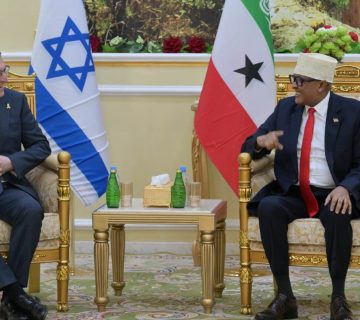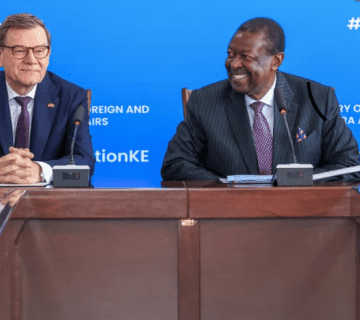Following nearly seven years of civil armed violence, there were hopes of a new dawn when South Sudanese leaders, President Salva Kiir and his erstwhile rival Dr. Riek Machar agreed to form the Revitalised Transitional Government of National Unity (R-TGNU) in February 2020. However, the outbreak of COVID-19 pandemic has presented additional pressure on an already unstable transitional government. The pandemic has ravaged what was already a very weak health system and threatens to stall the ongoing peace process. To overcome the crisis, the unity government will need to work together to stop the surging communal conflicts and ensure protection of the vulnerable population. International partners including regional peace guarantors, development partners and humanitarian agencies, too, need to remain actively engaged in bolstering national efforts to stave off the crisis.
Spread of Coronavirus
The first case of Coronavirus was recorded in the country on April 5, 2020, and as of August 19, 2020, official figures stood at 2,499 cases with 47 deaths. However, it is feared that the caseload could be higher given the limited testing and the mounting social stigma against COVID-19 patients that has discouraged many from taking the test. COVID-19 cases have been reported all over the country including the overcrowded United Nations’ (UN) Protection of Civilian (PoC) sites in Juba. First Vice-President Riek Machar and Defence Minister Angelina Teny are some of the high-profile figures who have contracted the virus.
With an extremely fragile health system coupled with low epidemiological standards, COVID-19 might have a devastating impact on the country’s social, economic, and political landscapes. According to a recent UN update, the outbreak is already disrupting routine health services with a significant impact on access to maternal healthcare, vaccinations, and treatment of curable diseases like malaria, pneumonia, and diarrhoea. Left unchecked, the pandemic might have a far-reaching debilitating impact on the healthcare system.
The pandemic is also creating a difficult economic situation in South Sudan. The country was already facing acute economic challenges with entrenched humanitarian crisis prior to the pandemic. With the pandemic and its knock-on effects on global economy, South Sudan’s economy is on a free fall, given the shrinking foreign aid, rising inflation, dwindling foreign reserves, and plummeting oil prices.
Infighting and Violence
Alongside the pandemic has been a spate of infighting and continued inter-communal violence. According to Armed Conflict Location and Event Data Project (ACLED), between March 1, 2020 and July 31, 2020, inter-communal armed clashes in various parts of South Sudan have resulted in about 1,082 fatalities with thousands of others left injured and displaced from their homes. Greater impact has been felt in Jonglei, where inter-communal violence between the Murle and Lou Nuer ethnic groups resulted in over 300 deaths. In Warrap, Unity, Western Bahr el Gazal, Western Equatoria, Central Equatoria, and Lakes states, new waves of inter-communal coupled with aggressive actions from the security forces have been reported since February 2020. This has disrupted economic activities, including the ability to engage in agriculture, one of the main sources of livelihood in South Sudan.
The loss of property and livelihoods, displacement from homes, an increasing number of people requiring emergency medical care and continued violence, have compounded the impact of COVID-19 pandemic in the country. In many ways, the conflicts have created an environment of deep uncertainty, making it almost impossible to enforce COVID-19-related health protocols such as physical distancing and basic hand washing. The violence also continues to over-stretch the capacity of humanitarian agencies to respond effectively in combating COVID-19. In some cases, humanitarian workers have fallen victims of this violence.
Obstructing the Peace Process
There is no doubt that both COVID-19 pandemic and the intractable conflicts are hampering the peace process and quest for stability in South Sudan. For example, the delayed appointment of state governors that came in late June could be attributed to disruptions related to the pandemic, although other factors such as constant disagreements between the parties were also at play. In addition, the pandemic is also affecting the implementation of crucial security arrangement provisions outlined in the peace agreement. To a greater extent, the cantonment, training and unification of soldiers have been scaled down to limit the spread of COVID-19 among forces. In Wau, for instance, soldiers have been asked to leave the site.
Considering the precarity of the security environment in South Sudan, the lack of or delay in implementing security arrangements risks fuelling further conflict, which might cause a complete collapse of the existing peace deal. In some regions, forced disarmament by government security forces is stoking violence with and among civilians thereby derailing the much-needed trust between civilians and security forces. It is imperative that transparency, confidence, and trust between the parties is achieved in handling the procedures of security arrangements to ensure that the gains realized so far are not reversed.
Muddling through the Crisis
The double crisis presented by the pandemic and continued violence in South Sudan calls for quick action both by government and the international community. At the national level, it is imperative that the implementation of the peace deal is fast-tracked as it provides the anvil upon which durable peace can be achieved. Following the appointment of state governors, the government should move a step further to strengthen governance at the grassroots by enhancing community participation in implementing security and peacebuilding programs that addresses the root causes of violence. Restoring security and safety in all regions, but more specifically, the areas hardest hit by COVID-19 will be necessary for facilitating access by humanitarian agencies in providing critical aid.
The international community, regional partners, and peace guarantors led by Intergovernmental Authority on Development (IGAD) should work with the parties to ensure that critical security arrangements are implemented. While full-scale training and unification of soldiers cannot be conducted given the current health situation in country, it is imperative to build confidence and cooperation among various armed groups to de-escalate tensions. IGAD, in particular, and other partners such as United Nations Mission in South Sudan (UNMISS), should prevail upon the government and holdout opposition groups such as National Salvation Front (NAS) to commit to the Cessation of Hostilities Agreement signed in 2017.
Finally, the international community and South Sudan’s development partners should work more closely with the national government in the fight against COVID-19 pandemic. Financial and material support in the form of personal protective equipment (PPEs), face masks, and various medical supplies should be sustained to boost the capacity of the health system in managing the crisis.
Joel O. Otieno is a Research Assistant at the HORN Institute
Photo: A specialist takes a sample from a patient in Juba, South Sudan on June 21, 2020 (Photo Credit: AP Photo/Charles Atiki Lomodong)



